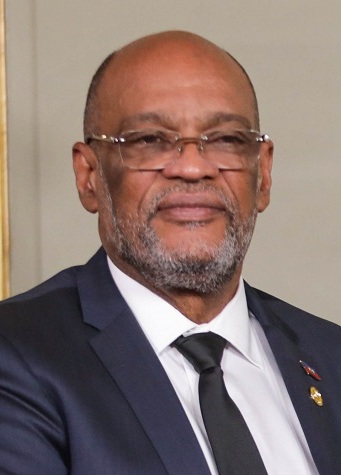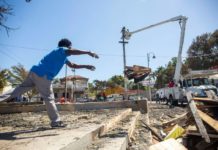A group of Haitian-American elected officials is calling on President Biden to withdraw support for a Kenya-led peacekeeping mission in Haiti, which they say will bolster acting President Ariel Henry’s grip on power.
The National Haitian-American Elected Officials Network (NHAEON) and Family Action Network Movement (FANM) on Friday wrote Biden and Secretary of State Antony Blinken with the request.
“Any military intervention supporting Haiti’s corrupt, repressive, unelected regime will likely exacerbate its current political crisis to a catastrophic one,” they wrote.
“It will further entrench the regime, deepening Haiti’s political crisis while generating significant civilian casualties and migration pressure.”
Yet the plan to intervene in Haiti under the auspices of the U.N. is barreling ahead.
On Monday, the United States and Kenya signed a five-year defense agreement in Nairobi, and Secretary of Defense Lloyd Austin told Kenyan Defense Minister Aden Duale the Biden administration is working to secure $100 million for the Haiti intervention plan.
Conditions in Haiti have been worsening progressively since the 2021 assassination of former President Jovenel Moïse, which led Henry to take power as acting president and acting prime minister.
Many Haitian and Haitian-American civil society organizations have clamored for the Biden administration to withdraw recognition and support for Henry, which they say is the main factor keeping him and his Haitian Tèt Kale Party (PHTK) in power.
“If your Administration were to withdraw its support for Dr. Henry, he would have been forced to negotiate with Haitian civil society and other groups toward a peaceful solution to Haiti’s current political crisis,” wrote the groups.
Advocacy groups such as NHAEON and FANM have claimed for years that Henry’s government is complicit in gang violence, and is fostering violent conditions to remain in control.
“This regime has dismantled Haiti’s democratic structures while facilitating and conceding control of the country to many gang leaders. The PHTK governments did not run a fair or timely election,” wrote the groups.
“They have created a prevalent culture of corruption that deprives the government of the necessary funds to support the Haiti National Police and provide basic governmental services to the Haitian population.”
But the Biden administration has been mostly unwilling to risk destabilizing Haiti.
“PM Henry is a transitional figure and the head of Haiti’s government. We work with him and his administration on a range of bilateral and multilateral issues, as does the rest of the international community,” a State Department spokesperson told The Hill.
Despite conditions in the country, U.S. officials have continued to deport Haitians back there.
That deportation policy bit back at the administration early on, as Biden’s special envoy, Ambassador Dan Foote, resigned in 2021 with a scathing letter calling the decision to deport Haitians inhumane and counterproductive.
In late 2022, the Biden administration redesignated Haiti for Temporary Protected Status (TPS), a measure that allowed more than 100,000 Haitians to live and work in the United States, a measure advocates had called for.
TPS status is assigned to countries where conditions are too dangerous to humanely repatriate its nationals.
But in designating Haiti, the Biden administration was careful not to criticize the Henry government, and suggested the opposition had been unwilling to negotiate a peaceful path forward.
“The State Department insists that Dr. Henry must be part of any transitional government. Dr. Henry has used the U.S.’s indifference to clinch power and continues to veto any proposed consensus to create an inclusive transitional government without him,” wrote the groups.
The appeal for the United States to take its thumb off the political scale in Haiti is at the center of advocates’ concerns about U.S. policy toward the Caribbean nation.
The United States has a long history of intervention in the country, including an occupation from 1915 to 1934 and three troop deployments over the past 30 years.
Civil society organizations and some Haitian elites are at odds over the need for foreign intervention in Haiti, an exercise that at times has come with disastrous results.
In 2016, former U.N. Secretary General Ban Ki-Moon admitted that United Nations peacekeepers played a role in starting a cholera outbreak in Haiti that led to the deaths of 10,000 people, though Ban did not say the U.N. directly caused the epidemic.
Episodes like that intervention have led civil society and opposition groups to greater distrust of outside measures to pacify the country.
The recurrence of foreign intervention has also led many in Haiti’s civil society to accuse the United States of condescension and paternalism.
The official position of the United States is that conditions on the ground would currently not allow for a free election.
“The State Department believes certain security conditions in Haiti must be met before a free and fair election can take place,” said the department spokesperson.
“A Multinational Security Support (MSS) mission would support the Haitian National Police (HNP) to achieve improved security. We continue to support a Haitian-led, consensus-driven political solution to restore democratic order in Haiti.”
But talks between former rivals in civil society and the opposition have been rendered moot by Biden’s support of Henry, say advocates.
“Over the past three years, groups across the spectrum have gathered, often putting long-running political disagreements aside, to agree on practical, promising plans for a transitional government. But each time, the de facto authorities defeat the promising effort by refusing any compromise,” they wrote.
The groups also called for U.S. authorities to enhance their efforts to avoid weapons trafficking to Haiti.
“Haiti does not manufacture guns and ammunition, but they originate from the U.S. and continue to destroy many lives, including U.S. Citizens. We strongly urge your Administration to effectively investigate armed trafficking to Haiti and provide more resources to the U.S. Customs and Border Patrols to inspect cargo leaving the United States to Haiti,” they wrote.




























![Phyllisia Ross – KONSA [Official Music Video]](https://haitiville.com/wp-content/uploads/2014/08/phyliisia.jpg)









